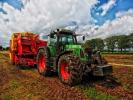H2020 DECISIVE Project: A decentralized management plan for the innovative valorization of urban bio-waste.
- Type Project
- Status Filled
- Execution 2016 -2021
- Assigned Budget 7.755.101,56 €
- Scope Europeo
- Main source of financing Horizon 2020
- Project website DECISIVE
The rapid growth of cities leads to a growing demand for energy, food, and efficient waste management systems. In this context, the EU-funded DECISIVE project seeks to transform urban waste management into a circular economy. By implementing innovative solutions, such as decentralized management networks and eco-designed fermentation processes, DECISIVE aims to address the logistical, environmental, and health impacts of waste management in urban areas.
This paradigm shift will foster integration between urban and peri-urban areas. The project aims to move from an import-dependent, externally managed waste management system to a cooperative network that enables the decentralized valorization of biowaste. With its comprehensive approach, the project promises to revolutionize waste management for the benefit of growing cities around the world.
The growing attractiveness of cities leads to population growth, which increases energy and food demands in urban areas. This makes urban waste management increasingly challenging, both in terms of logistics and environmental and health impacts. To reduce the environmental impacts of cities and contribute to greater resilience of urban areas to energy or food supply crises, it is necessary to improve waste management systems to increase resource recycling and local recovery.
In this context, the DECISIVE project proposes shifting the current urban metabolism of organic matter (food, plants, etc.), energy, and biowaste toward a more circular economy and assessing the impacts of these changes on the entire waste management cycle. The challenge will therefore be to move from an urban "gray box," primarily involving the import of goods and the management of extra-urban waste, to a cooperative organization of intra- and peri-urban networks that enable the local and decentralized circular valorization of biowaste through the production of energy and bioproducts.
This new waste management paradigm is expected to increase the sustainability of urban development by:
- Promote citizen awareness of the costs and values of waste.
- Promote the production and use of renewable energy in the city.
- Develop an industrial ecology approach that can promote integration between urban and peri-urban areas, providing valuable agronomic byproducts for the development of urban agriculture and thus improving the balance of organic products and waste in the city.
- Develop new business and job opportunities.
To achieve these objectives, the DECISIVE project will develop and demonstrate, on a full-scale, eco-innovative solutions for waste and utility operators, consisting of:
- A decision-support tool for planning, designing, and evaluating efficient decentralized biowaste management networks in urban areas.
- Eco-designed solid-state fermentation processes.
In addition, in parallel with the full-scale demonstration sites, a new, environmentally friendly microanaerobic digestion process will be developed and tested.
Localized circular economies for recycling urban biowaste could have a global impact. Growing urbanization increases the energy and food needs of cities; however, much of urban food ends up as waste. EU research has closed this vicious cycle by transforming waste locally and sustainably into energy and organic products for urban agriculture. People living in cities produce a large amount of solid waste, and unfortunately, the amount of waste generated by each person is increasing even faster than the number of city dwellers, creating a spiraling problem. Organic waste accounts for more than 34% of urban solid waste in Europe.
The EU-funded DECISIVE project developed decentralized solutions for bio-waste management that generate local energy and organic products, such as fertilizers and biopesticides, for use on urban or peri-urban farms. Small solutions with a huge impact “Urban bio-waste, which is primarily food waste, is both a waste management challenge and an opportunity due to the energy and agronomic potential of its high organic matter content. DECISIVE implemented two key technologies for the decentralized valorization of bio-waste that exploit this potential,” says Anne Trémier of the French National Research Institute for Agriculture, Food and Environment (INRAE) and coordinator of the DECISIVE project. Anaerobic digestion of organic matter by microorganisms produces methane-rich biogas that can be used to meet heating or electricity needs.
DECISIVE’s microscale digester concept uses little energy and water and is simple enough for a layperson to operate. The remaining solid organic matter is valorized through solid substrate fermentation (SSF), an aerobic process also utilized through composting. SSF creates a waste recycling cycle and requires less water than conventional industrial fermentation processes. With it, DECISIVE produced an organic fertilizer and a biopesticide for vegetables. A pilot project at the Ecully-Dardilly Agricultural Institute in Lyon valorizes food waste from local restaurants and cafeterias to support the institute’s urban garden. Turbocharged Technology for a Successful Launch “To make the most of these technologies, DECISIVE has created a decision-support tool aimed at communities, design offices, and waste facility operators, freely available on the project website,” adds Trémier. For a selected biowaste management system, it quantifies the relative intensity of transport and material and energy recovery.
It then generates an environmental assessment that includes the impact on climate change and toxicity, as well as an economic evaluation of costs. A social assessment of waste suppliers, the necessary labor and space, and an analysis of regulatory requirements are also described. The tool also helps plan the best location for micro-scale treatment and connected waste collection circuits in a given area. A circular economy for urban bio-waste DECISIVE has attracted the interest of communities, citizen associations, private waste management organizations, and the European Commission itself, which referenced one of its publications in its report on food waste in the EU. Trémier concludes: "DECISIVE explored a completely new concept for the sustainable development of communities. The decentralized and local valorization of urban bio-waste, organized in a network, reduces the impact of waste collection (road traffic and environmental emissions) by promoting new collection solutions (green mobility)." Promotes local food production using organic fertilizers from biowaste.
Finally, it creates jobs for biowaste collection and treatment and local agriculture." Given that organic waste accounts for nearly half of all municipal solid waste worldwide, DECISIVE's digesters could soon generate energy and organic products, driving greener cities, both literally and metaphorically.
- INSTITUT NATIONAL DE RECHERCHE POUR L'AGRICULTURE, L'ALIMENTATION ET L'ENVIRONNEMENT (INRAE)






